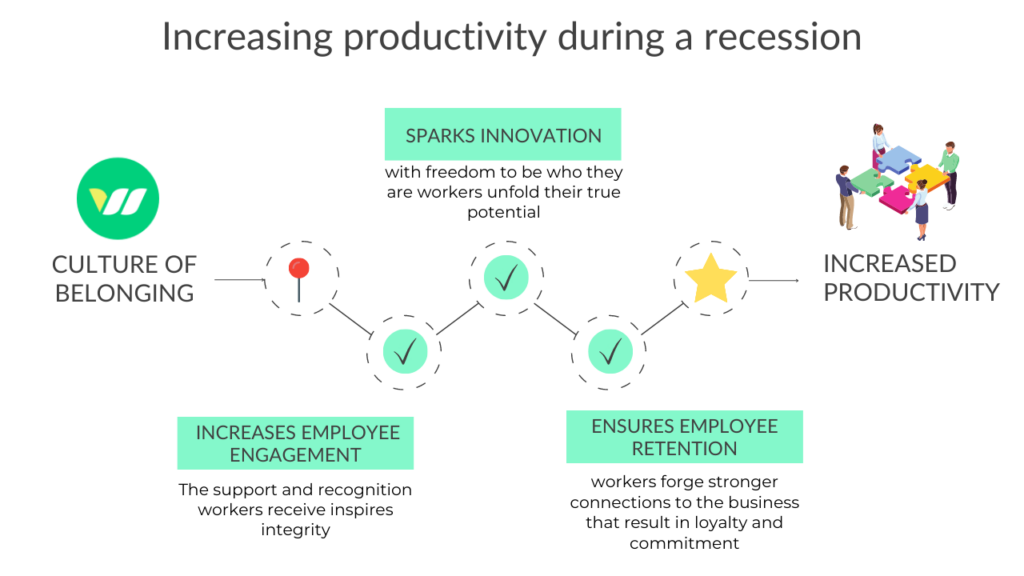Here’s What to Do When a Recession Impacts Your Business
If there’s one thing business owners have learned over the past few years, it’s to expect the unexpected. Market uncertainty has been about the only certainty—and it takes smart, innovative, confident planning to navigate organizations through such challenging times.
This is especially true when economic downturns or recessions hit. They lead to decreased demand and revenue, the need to squeeze budgets, and genuine stress. But they also present opportunities to grow, transform, and pursue innovative potential.
This article is a practical guide on the challenges to expect when you’re running a business in a recession, and the steps you can take to help your business come out even better on the other side.
Quick Takeaways:
- Recessions impact every financial aspect of running your business: market demand, sales, cash flow, funding opportunities, and more.
- When a recession hits, it’s important to recognize these challenges and take practical steps to optimize spending and reduce budgets when possible.
- Enhancing your brand presence with cost-effective digital marketing can keep you connected and engaged with your key audiences.
- Customer and employee trust is crucial during tough economic times, and it requires transparent and frequent communication.
- Recessions present unique opportunities to grow through strategies like innovative business models, new product/service offerings, and brand collaborations or partnerships.
The Reality of Running a Business in a Recession
Since it’s impossible to avoid the impacts of a recession—especially in fast-changing and unpredictable markets like the ones we’re experiencing today. It’s important to refocus on how you’ll deal with the impacts of a recession when they arrive. While recessions undoubtedly create challenges that may feel daunting in the moment, they also present unique opportunities for innovation and growth.
First, let’s understand the challenges you can expect to experience when a recession hits.
The first is a drop in sales. In an economic downturn, consumer spending unsurprisingly decreases as buyers look to preserve cash capital for their own businesses. This squeeze can feel especially intense in industries deemed non-essential or luxury.
When sales drop, revenue drops too. There will be pressure to scrutinize and tighten up budgets, which often creates a feeling of stress inside the organization. Cash flow constraints may become a critical concern. With incoming revenue reduced, managing operational costs, payroll, and debt obligations can become increasingly difficult.
From a market perspective, volatility abounds during a recession. Fluctuating prices, interest rates, and exchange rates make financial planning and forecasting more complex. Businesses may find it challenging to secure funding for certain projects as investors and lenders become more risk-averse.
Collectively, these challenges require C-suite and other high-level leaders at the organization to stay committed to steering the ship with unified, confident, and transparent messaging, as well as a strategic plan designed to keep business strong despite the challenges brought on by the recession.
In the next section, we’ll walk through steps you can take to handle recession impacts effectively and even pursue new opportunities amidst external adversity.
7 Smart Steps for Growing Your Business Amidst Adversity
Running a business in a recession is undoubtedly stressful—but it also opens the door for strategic realignment, a renewed focus on core competencies, and the pursuit of innovative solutions to difficult situations.
Most companies seem to recognize this, as demonstrated by the recent results of Nationwide’s most recent Economic Impact report. While only 39% of business owners were positive about the business conditions of the U.S. economy as a whole, 74% felt positively about their individual companies.

In other words: Businesses feel in control of their own destinies, even when recessions hit. Here are some practical, best-practice steps you can take to achieve the same:
1. Optimize Spending and Eliminate Unnecessary Costs
According to Rebecca Henderson of Harvard Business School, during a recession, “Rule One Is: Don’t crash the company.” In most cases, that translates to: “Don’t run out of money.”
When a recession hits, smart financial management is crucial. It’s both a safeguard in case the downturn lasts and a way to open up new opportunities for growth. During this step, audit current expenses and identify areas where you can cut costs without compromising the quality of your products and services.
This might involve renegotiating contracts with suppliers, reducing your overhead costs, or streamlining operations to enhance efficiency.
2. Diversify Revenue Streams
Relying on a single source of income can be risky, especially during economic downturns. Get innovative and explore new markets, add complementary products or services, or consider different business models to diversify your revenue streams. This diversification can help stabilize your income and reduce vulnerability to market fluctuations.
Even better? It doesn’t have to come with heavy costs. Sometimes, simply offering a new combination package or approaching delivery methods differently can jumpstart new income opportunities.
3. Enhance Online Presence and Digital Strategies
Modern digital marketing offers vast opportunities for keeping your business visible and active—and at low cost. If you’re feeling the impacts of a recession, take time to strengthen your online presence with tactics like updating your website, increasing social media and SEO activity, and engaging directly with your online audiences when possible.
Not only is this a cost-effective way to focus on business growth, it’s also a direct channel for building trust with your audience through thought leadership and direct interaction. Don’t be afraid to directly address the recession situation and its impacts. More specifically, address the ways your business is helping clients navigate it successfully.
4. Focus on Customer Retention
In any economic landscape, acquiring new customers is more expensive than retaining existing ones, but it’s especially true during a recession. When an economic downturn hits, focus on keeping your current customers happy, and emphasize that you’ll be delivering the same consistent, high-quality products and services you always do.
Research shows that customer loyalty during events like a recession are directly related to how well they respond and communicate during the crisis.

Maintain regular communication with your customer base during this time to keep them engaged and to field any questions or concerns they may have. Aim to recognize any changing recession-induced needs they have and address them quickly, fostering loyalty and trust and encouraging their continued business.
5. Invest in Employee Development and Culture
Your employees are your most valuable asset. Investing in their development and fostering a positive workplace culture can increase productivity and innovation. Engaged and motivated employees are more likely to contribute to the company’s resilience and growth.
As with your customers, maintaining employee trust during this time is critical to reduce turnover and keep morale high, even when circumstances are not ideal. Communicate with honesty and authenticity to cultivate a sense of belonging and community even when times are tough.

6. Utilize Data-Driven Decision Making
When you’re running a business in a recession, leveraging data to make decisions is essential. Use data about customer behaviors, market trends, and internal performance metrics to guide strategies and help you plan for the future.
This approach removes strategic guesswork and can help you identify opportunities, optimize resource allocation, and adapt quickly to changing market conditions.
7. Explore Collaboration Opportunities and Partnerships
Collaborating with other businesses, either through partnerships, joint ventures, or strategic alliances, can open up new opportunities for growth. These collaborations can help you enter new markets, share resources, and reduce risks associated with new ventures.
During a recession, take time to review your partner network. As a leadership team, brainstorm the potential opportunities for partnerships and collaborations that exist for your business. This could mean anything from joint marketing or event hosting to even offering combined product/service packages.
Running a Business in a Recession: The Bottom Line
If you’re running a business of any kind, you will inevitably deal with tough economic times and even full scale economic recessions. The key to succeeding through these challenges is achieving the right balance of practicality (i.e. optimizing your budget and doubling down on retention) while also looking for new and innovative ways to grow (ex: new business models and partnerships).
Above all else, the leaders of your organization must work together to present a united front, keep your employees motivated, keep customers happy, and maintain a positive culture. Transparency is key—all of your stakeholder groups understand you’ll experience difficulties during a recession, so it’s important to be honest about how you’re handling them and what your plans are for the future.
You can steel your business against the toughest impacts of a recession by putting solid systems and tools in place now that automate key processes like demand generation, sales, and customer service and support. Televerde can help you do it.
Our trusted B2B solutions are both rooted in industry best practices and customized to meet the unique needs of every individual client. Talk to our team today to learn how we can help you grow.



